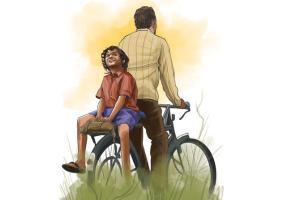But, each industry has such complementary strengths, that it is vital they keep trying until they consistently produce solid, mutually satisfying films

Illustration/Uday Mohite
 Baba (Father) is an important film, representing the long-overdue shaadi between the Bollywood and Marathi film industries. Directed by Raj R Gupta, in Marathi, and starring the delightful Deepak Dobriyal, it is produced by Sanjay Dutt, Maanyata Dutt and Ashok Subhedar. More efforts by Bollywood to do hawala of its sins of a century and purify itself by producing Marathi films.
Baba (Father) is an important film, representing the long-overdue shaadi between the Bollywood and Marathi film industries. Directed by Raj R Gupta, in Marathi, and starring the delightful Deepak Dobriyal, it is produced by Sanjay Dutt, Maanyata Dutt and Ashok Subhedar. More efforts by Bollywood to do hawala of its sins of a century and purify itself by producing Marathi films.
ADVERTISEMENT
Of course, there have been many examples of the Bollywood-Marathi arranged marriage, including Umesh Kulkarni's exquisite Vihir (The Well, produced by Amitabh Bachchan's ABCL), Ventilator (Priyanka Chopra) and Sachin Kundalkar's Aiyya (Anurag Kashyap-Viacom 18). It's an uneasy truce, because Bollywood is a universe unto itself, and Marathi cinema has a powerful, rooted tradition, and draws deeply from intellectually rigorous Marathi theatre. So, Bollywood feels usko bahut upar jaana hai, and Marathi cinema feels usko bahut neeche aana hai, until they find a middle ground. But, each industry has such complementary strengths, that it is vital they keep trying until they consistently produce solid, mutually satisfying films.
Baba is a pleasant, mass-appeal film that splices two emotionally loaded issues: a deaf-mute couple bringing up a child that hasn't spoken a word until it is eight years old, and biological parents versus adoptive parents. The overriding strength of the film is undoubtedly the immensely gifted Deepak Dobriyal, whom Bollywood mainly showcased only in brief flashes, such as in Omkara and Tanu Weds Manu Returns, and the rare lead as in Daayen ya Baayen. Great that Marathi cinema could offer him a worthy lead role, and smart to make him deaf-mute. As Madhav and Anandi, he and Nandita Patkar play deaf-mute parents to Shankar (Aryan Meghji). They are a loving, happy family until a rich couple, Rajan and Pallavi, suddenly claim Shankar is her son. There's a court case: Shankar is Pallavi's illegitimate child, abandoned soon after birth, but adopted by Madhav-Anandi, who have raised him for eight years. Now married but childless, Pallavi comes to reclaim her child, leading to emotional explosions. In this, it is linked to Charlie Chaplin's The Kid, to which the film refers.
There have been a number of sophisticated Marathi films with child or teen protagonists, including Umesh Kulkarni's Vihir, Avinash Arun's Killa, Sandeep Sawant's Shwaas, Nagraj Manjule's Sairat and Prasad Oak's marvellously mature Kaccha Limbu, that addressed a mentally challenged teenager's sexual desires. With Baba, one feels that the director kept looking over his shoulder to check that he had Big Brother Bollywood's approval. Gupta has a strong story to tell, but the direction is broad and laboured. Despite the tragic climax, Bollywood holds a gun to his head: Ay bhai, happy ending dega ki nahin? So, suddenly, a happy ending is summoned in handcuffs. Nandita Patkar is good, but Meghji is far too treacly. The gifted Chittaranjan Giri is largely wasted here, but Spruha Joshi and Abhijeet Khandkekar are competent. Manish Singh's screenplay, mildly inventive, takes the scenic route. With a deadline of 22 days to make the child speak, that could persuade the court to let the adoptive parents keep him, why did the parents not co-opt the child in their plan? And as the child is normal, but doesn't speak only because his parents communicate to him in sign language, why didn't the parents enrol him in school anyway? There's broad comedy, as well as emotional manipulation that has you in tears. The parents use common gestures, instead of formal sign-language, so everyone can follow them.
The cinematography is competent, but the editing/screenplay could have been more taut. The music underlines each emotion. I am concerned that the film may fall between two stools, but as it's an important Bolly-Marathi arranged marriage, I really hope it turns to an 'arranged love marriage.'
Meenakshi Shedde is India and South Asia Delegate to the Berlin International Film Festival, National Award-winning critic, curator to festivals worldwide
Catch up on all the latest Crime, National, International and Hatke news here. Also download the new mid-day Android and iOS apps to get latest updates
 Subscribe today by clicking the link and stay updated with the latest news!" Click here!
Subscribe today by clicking the link and stay updated with the latest news!" Click here!






